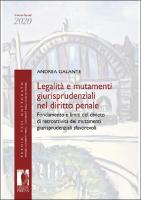Legalità e mutamenti giurisprudenziali nel diritto penale
Fondamento e limiti del divieto di retroattività dei mutamenti giurisprudenziali sfavorevoli
Abstract
Over the past several years, constitutional, supreme and human rights courts had to deal with the problem of adjudicative retroactivity in criminal law with ever-greater intensity. Following the case Contrada c. Italie, in which the European Court of Human Rights found a violation of the legality principle under Art. 7 due to an unforeseeable retrospective application of a judicially created criminal offence, the issue of citizens’ safeguard upon an overruling occurrence is even more in the foreground. What temporal effect is best given to an unfavorable overruling decision? Should its application be limited to acts and conduct occurring after it or should it operate retrospectively and subject to criminal responsibility those who, acting in reliance on an earlier decision, did only what courts declared to be lawful? A limited prohibition of adjudicative retroactivity in criminal law seems to help foster an up-to-date relationship between the individual and the state.


 Download
Download Web Shop
Web Shop